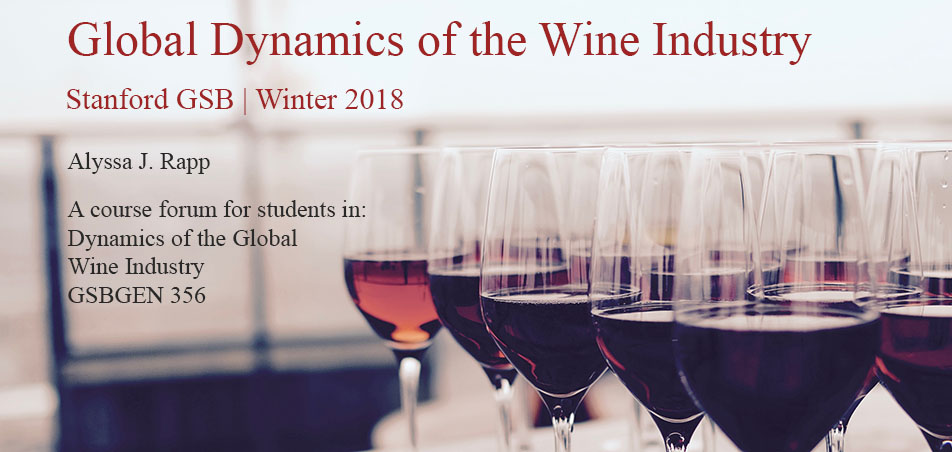Christine started the class by explaining that she is a part of the 5th generation of the Wente family working on their vineyard. She joked that her business card states just that.
In light of our conversation around perceived quality as a strategy for DBR, I started wondering why it was that when Christine mentioned "part of the family," I immediately perceived Wente to be of high quality. As I've reflected on why that is, I've found myself thinking:
Well, if it''s a family business, they must have a secret sauce that's passed down that keeps working.
or
Well, if it's a family business, each new leader of the company knows their stuff down pat.
I found, though, that it's not as much a rational reason as it is some association in my head with the idea of a "family business" and trustworthy.
As we continue to discuss players in the industry, I'd like to keep an eye out on family wineries and their competitive advantages -- is perceived quality the common theme?

This comment has been removed by the author.
ReplyDeleteThis comment has been removed by the author.
ReplyDeleteDivya – this is a really interesting point. I think family businesses might sound appealing to consumers for a few reasons. I, for some reason, correlate family businesses with being ethical. While I don’t think I’ve ever seen hard data on this, I think there is sometimes an assumption that big corporations mistreat their laborers, while families business act more wholesomely. I also wonder if family businesses sound particularly appealing to consumers in this day and age due to the movement toward organics/local/unprocessed food and bev. I often associated massive food and beverage brands with using pesticides and unhealthy practices, but associate smaller family owned businesses with more healthy and sustainable practices.
ReplyDeleteI came across a couple of interesting stats about family businesses, which I think could contribute to our impression that family-run wines are of higher quality.
ReplyDelete1) Average lifespan of a company listed in the S&P 500 has decreased from 67 years in 1920s to just 15 years today. It seems like companies are scaling faster, and probably are maturing and dying off faster than before. It is truly remarkable that many of the family businesses are through their 5th, 10th or even 15th generation in today's world. I have to believe that there is some secret sauce that was passed down through generations - maybe a long-term view rather than short-term profitability, maybe it's the dedicated focus on reputation.
2) Family Business Institute estimates only 1/3 or family-owned business last into a second generation of ownership, 12% to a third, and just 3% for a fourth. Even within family businesses, it is incredibly hard to pass along the tradition, value and expertise through one generation, or in Wente's case, five generations. We got a glimpse of the difficulties the Wente family faced over the last 100+ years, but I can only imagine the unique challenges and opportunities each generation were facing. I definitely have higher respect for a long-lasting family business such as Wente after learning about this stat.
The conventional wisdom holds that family-owned and privately held firms can be very successful, but their scale and scope are necessarily limited. Corporations have better access to capital and may have a more efficient governance.
ReplyDeleteWine is perhaps the one exception to the dominant corporation rule. 2015 data Wine Business Monthly shows that only four of the top ten wine firms are public corporations or subsidiaries of public corporations. The other six are family-owned or, like The Wine Group, privately-held and together they produce more than half of all the wine sold in America.
Family businesses tend to take a multi-generational approach and are able to negotiate the trade-off between short run returns and long run value. Corporations, it is said, are sometimes driven too much by quarterly returns and end up sacrificing the long term to achieve immediate financial goals.
When business requires a long run vision, families gain an advantage. Wine is certainly a business where it is necessary to look into the future if only because vines are perennials not annuals like corn or soybeans and successful brands are perennials, too.
The element of family businesses that has always struck me as remarkably liberating is the ability to optimize for the long-term. I think it's the inner idealist in me that finds this especially attractive. But so often businesses--or even more often business people-- are forced to solve for the near-term to satisfy bosses, customers, investors, or for team dynamics. I used to get incredibly upset at my pre-GSB role at a fashion ecommerce company, when it felt like all we ever did was apply band-aid after band-aid to make it through the week, or the holiday season, or the quarter. By doing this we were highly inefficient ineffective and could never compete at the highest level.
ReplyDeleteIn speaking with classmates last year who were taking the family business GSB course, the realization hit me that while some of this is unavoidable, family businesses were far more immune to such frustrating practices. I wonder if this is especially beneficial in an industry, like wine, with relatively long-term and time-consuming operations where your ROI and payback tend to be calculated in decades rather than months or years.